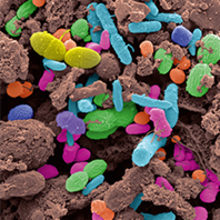Policy: Exploring the potential of microbiome research
Issue: The Mobile Microbe
08 November 2016 article

Microbiomes – the microbial communities found in and on human, animal and plant hosts, and associated with other environmental niches – are a hot topic.
Driven by advances in high-throughput sequencing and meta-omic approaches, microbiome research is a rapidly developing area of microbiology. Not only researchers, but also industry, funders and other supporters and end-users of research are increasingly interested in the potential implications and applications of exploring and exploiting microbiomes, for example, for human and animal health, and improving agricultural efficiency and sustainability.
However, much fundamental research remains to be done to understand the composition, dynamics and functions of many microbiomes. One challenge this raises is ensuring policy-makers and the wider public are appropriately engaged and informed, without current research being interpreted out of context and oversold.
Importantly, there is growing international consideration among the research community and other stakeholders about the science and policy gaps and challenges that need to be addressed to progress fundamental and translational microbiome research. Notably, the US White House Office of Science and Technology Policy have launched a National Microbiome Initiative, with federal agencies allocating $121 million of funding, substantial private investment, and goals to support interdisciplinary research and develop infrastructure.
Given the widespread interest in microbiome research, and its associated scientific and societal opportunities and challenges, the Microbiology Society identified an important need for policy-makers and other stakeholders in the UK and Ireland to have access to appropriate scientific information and expert opinion about this rapidly emerging field. The Society has established a Microbiome Expert Working Group to oversee the development of an accessible, evidence-based report, which will consider current and future developments in microbiome research across human and animal health, agriculture and food, and the environment, and its public policy relevance.
The Microbiome Expert Working Group’s first meeting was held in July in London at the British Academy. Chaired by Professor Julian Marchesi, the multidisciplinary group of experts considered what defines microbiomes and microbiome research, potential opportunities for discovery and translation, and the scientific, policy and regulatory gaps and challenges that need to be addressed to realise these opportunities. Dr Mark Bale, Deputy Chief Scientific Adviser at the Department of Health, also spoke to the group about how microbiome research and the report could help inform public health policy-makers and advisers.
Over autumn, the Society is holding several multidisciplinary stakeholder workshops in the UK and Ireland. The workshops will further inform the report and aim to facilitate interdisciplinary networking and knowledge exchange between researchers, and with other stakeholders, such as representatives from funders, industry, regulators and public health.
The final report will be published next year. In the meantime, keep an eye on our e-newsletter for updates and activities linked to the project. We are also planning some allied communications and engagement activities, to provide the wider public with accessible, expert information about microbiome research.
Previous Microbiology Society expert panels have produced policy reports on food safety and security and sexually transmitted infections. For more information about these reports and the Microbiome Policy Project visit our website or get in touch by email.
PAUL RICHARDS
Policy Officer
[email protected]
Image: Faecal bacteria. Steve Gschmeissner/Science Photo Library..
